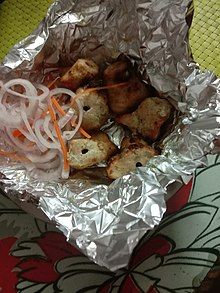Reshmi kabab
This article needs additional citations for verification. (September 2021) |
 Reshmi kabab served on foil sheet and accompanied by salads. | |
| Type | Kebab |
|---|---|
| Course | Starters |
| Place of origin | Indian Subcontinent |
| Region or state | Indian Subcontinent |
| Associated cuisine | Pakistan, India |
| Serving temperature | Hot [1] |
| Main ingredients | Chicken |
| Ingredients generally used | Cashews, Almonds and Malai |
| Variations | Reshmi Malai Kabab[2] |
Reshmi kabab is a chicken kebab commonly eaten [citation needed] in India and Pakistan. Made with boneless chicken, it is cooked by marinating chunks of meat in curd, cream, cashew nut paste, spices and then grilled in tandoor.[3]
Etymology
[edit]The Hindi-Urdu word 'Reshmi' means 'silk', known for the kabab's smooth texture. Its nickname 'Reshmi Malai Kabab' has an extra word added 'Malai', which means 'creamy' in Hindi-Urdu.[4] The word 'Malai' is also seen in Malai Kofta, another South Asian dish.
Description
[edit]Reshmi kababs have a crusty upper layer and a soft interior. Mughal culinary influence can be seen in the usage of a lot of cream and cashews.[3]
Reshmi kababs are often served with chutney, specifically Mint Chutney, and with salads of grated carrots, cucumber and onions.[5]
The use of curd, cream, cashew nuts and spices as marinade gives Reshmi kababs their unique taste. The time-span in which it is cooked is considered as a crucial concept which determines its taste.[6]
See also
[edit]Further reading
[edit]- https://www.crazymasalafood.com/top-20-delicious-and-irresistible-north-indian-food/
- https://www.indiatimes.com/news/india/the-1000-year-history-of-the-kebab-on-your-plate-251253.html
- https://foodiesterminal.com/chicken-reshmi-kabab-recipe/
- https://zaiqedar.blogspot.com/2022/12/reshmi-kabab-recipe.html
References
[edit]- ^ "Chicken Reshmi Kabab Recipe". April 13, 2019.
- ^ "Reshmi kabab recipe | Chicken malai kabab". Swasthi's Recipes. October 26, 2012.
- ^ a b "The 1000-Year History of Kebabs on Your Plate". February 2017.
- ^ "Make Tangy, Juicy Reshmi Kabab in 5 Easy Steps". The Spruce Eats.
- ^ "Chutney Recipes Pakistani | Indian | Best sauces recipes". Delicious Recipes. Retrieved 2023-01-11.
- ^ "Reshmi Kabab Recipe - How to make Reshmi Kabab". Tasty Indian Recipes. August 10, 2012.
